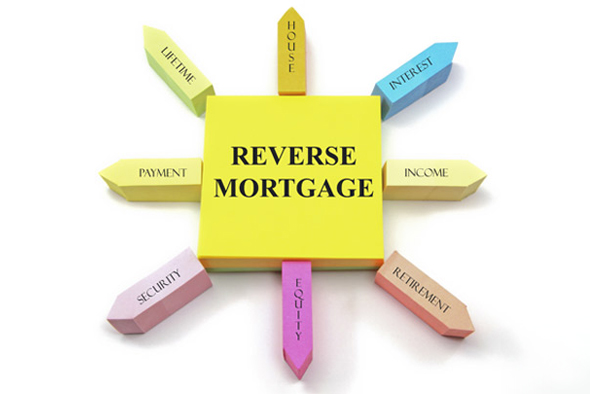
Reverse Mortgage - Is It Right For You?

So, you’ve heard the term reverse mortgage and you want to know what it is. Do you qualify? Is it right for you and your situation? Reverse mortgages are complicated. For some people, it is a good option in order to supplement income, or pay for health care expenses. For others, it’s not a good option, especially when considering your estate and heirs.
To understand a reverse mortgage, you must first understand the term “equity.” Equity is the difference between the value of the asset/interest and the cost of liabilities of something owned. For example, if you own a house worth $150,000, but owe $100,000, you would have $50,000 of equity in your home.
With a reverse mortgage, you borrow against the equity in your home (get a loan for part of the equity), allowing you to receive a cash loan without having to sell your home or pay any additional monthly bills. In other words, reverse mortgages take the equity in your home and turn it into a loan/payment for you. The money is usually tax-free and doesn’t have to be repaid for as long as you live in your home. In the event of the death or relocation of the borrower(s), the reverse mortgage must be repaid by the borrower, a spouse or the borrower’s estate.
There are considerations to think about before shopping for a reverse mortgage.
- You have to meet certain qualifications to be able to get a reverse mortgage. You must be at least 62 years of age and have equity in your home.
- There are fees and costs associated with reverse mortgages. These can include closing costs, origination fees, mortgage insurance premiums and service fees throughout the life of the loan. Be sure to ask the lender to explain the Total Annual Loan Cost (TALC).
- Many reverse mortgages have variable rates. This means that the interest rate will change over time, often increasing. There are fixed rate reverse mortgages, but they are not as common. Fixed rate reverse mortgages often limit the amount you can borrow and may require you to take a lump sum instead of payments.
- Interest is not tax deductible, until the loan is paid off.
- Interest is added to the balance each month. This means you owe more over time, increasing the total balance, as you are not required to make monthly payments towards the loan.
- You are still responsible for other home-related expenses. Property taxes, maintenance, insurance and utilities are still paid by the homeowners.
- Reverse mortgages use up the equity in your home. In the event of relocation or death, you, a spouse or the estate is responsible for repayment of the loan. If you or your heirs would like to keep the home, you or they can repay the loan and interest. If they choose to purchase the property, they should never have to pay more than the appraised value of the home, even with accumulated interest added throughout the life of the loan (non-recourse clause).
- There are situations that would require you to repay the reverse mortgage. Be sure that you understand all instances that may require you to repay the loan, for example, relocation.
- Reverse mortgages and rates are different from lender to lender. Be sure to shop around for rates and compare associated costs before selecting a lender.
- Reverse mortgages lessen your estate.Because you are borrowing against the equity, your estate is responsible for repaying the loan in the event of your death, thus lessening the amount of assets you leave to your heirs.

Types of Reverse Mortgages
There are three types of reverse mortgages, each with different costs, fees and terms. The amount of money you are able to borrow, as well as the type of reverse mortgage you qualify for, is based on factors such as: age, home value, current interest rates and financial assessment. Below are the types of reverse mortgages, with brief descriptions of each.
Single Purpose Reverse Mortgages
Single purpose reverse mortgages are offered by some state and local government agencies, as well as non-profit organizations. They are the least expensive option, but not available everywhere. Single purpose reverse mortgages can be used for one purpose, which the lender specifies, i.e. home repairs, property taxes, etc. In some cases meeting with a financial counselor is required.
Proprietary Reverse Mortgages
Proprietary reverse mortgages are loans from private lenders. Depending on the home value and equity, you may qualify for a larger amount with a proprietary reverse mortgage. These loans can have higher costs associated. In most cases, these loans can be used for any purpose.
Home Equity Conversion Mortgage
Home equity conversion mortgages (HECM) are federally insured and backed by the U.S. Department of Housing and Urban Development (HUD). The upfront costs of HECMs can be high, however the money can be used for any purpose. Meeting with a financial counselor is required to ensure that all costs, fees and terms are understood. HECMs allow the borrower to choose from several payment options including a single disbursement, fixed monthly payments, a line of credit or a combination of these options. HECMs also allow for the borrower to live in a nursing home or other medical facility for up to 12 consecutive months before the loan must be repaid.
As with many loans, reverse mortgages allow you up to three days to cancel without penalty in most cases. Most reverse mortgages can be repaid early, and without penalty. Be sure to understand the terms and conditions as well as all associated costs when considering the reverse mortgage option. Shopping around before signing papers is also a good idea in order to be sure that you are making the best choice for your situation and your heirs. When making major financial decisions, it is a good idea to meet with a financial planner who has knowledge of your specific situation
Sources:


